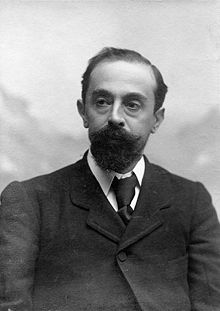Joan Maragall
You can help expand this article with text translated from the corresponding article in Catalan. (December 2010) Click [show] for important translation instructions.
|
Joan Maragall i Gorina | |
|---|---|
 Joan Maragall, by Pau Audouard dated 1903. | |
| Born | 10 October 1860 Barcelona, Catalonia, Spain |
| Died | 20 December 1911 (aged 51) Barcelona, Catalonia, Spain |
| Occupation | Poet, translator, journalist |
| Literary movement | Modernisme |

Joan Maragall i Gorina (Catalan pronunciation: [ʒuˈam məɾəˈɣaʎ]) (10 October 1860 in Barcelona – 20 December 1911) was a Spanish Catalan poet, journalist and translator, the foremost member of the modernisme movement in literature. His manuscripts are preserved in the Joan Maragall Archive of Barcelona.
Life
Maragall's upper-class family was dedicated to the flourishing textile industry in Barcelona, and after finishing school, Joan Maragall took on his father's job. Having never liked his family's trade, he decided to go to university instead where he studied law to his fathers great disappointment. Unfortunately, he never finished. Instead he dropped out of school and married Clara Noble, with whom he had 13 children. In 1904 he won all three prizes awarded by the Jocs Florals in Barcelona, and was proclaimed Mestre en Gai Saber. His private home in Sant Gervasi was bought by the Biblioteca de Catalunya and can be visited.
His grandson Pasqual Maragall would become mayor of Barcelona and subsequently President of Catalonia.
Work
Maragall's poetry was based on life and nature. Highly influenced by German-language authors such as Nietzsche, Novalis and Goethe, all of which he translated into Catalan, his poetry went through decadentist and vitalist periods. He is best known for his 'theory of the living word', or teoria de la paraula viva, which advocated Nietzschean vitalism and spontaneous or even imperfect writing over colder and thought-over poetry.
In addition to his poetry writing, he also cultivated journalism in the main avantgarde magazines of the time: L'Avenç, Catalònia and Luz, from where he became the main figure of the Catalan modernisme.
He was also a supporter of Iberian Federalism[citation needed].
Poetic works
- Poesies (1895)
- Visions i Cants (1900)
- Les Disperses (1904)
- Enllà (1906)
- Seqüències (1911)
- includes the poem La fageda d'en Jordà
Digitized works
Digitization is available through the portal El món de Joan Maragall: Col·lecció visual de la vida i l'obra de l'autor or directly at Memòria Digital de Catalunya
See also
External links
- Maragall Archive at National Library of Catalonia
- [http://www.bnc.cat/digital/jmaragall/ Digitized works of Joan Maragall at National Library of Catalonia
- Year Joan Maragall 2010-2011
- Joan Maragall in LletrA, Catalan Literature Online (Open University of Catalonia) Template:En icon Template:Es icon Template:Ca icon
- Biography and works of Maragall (Spanish)
- Vídeo Joan Maragall (Catalan)
- Joan Maragall vist per Jordi Maragall i Noble (Spanish)
- Works by or about Joan Maragall at Internet Archive
- Works by Joan Maragall at LibriVox (public domain audiobooks)

